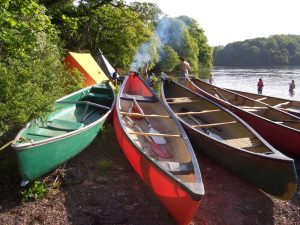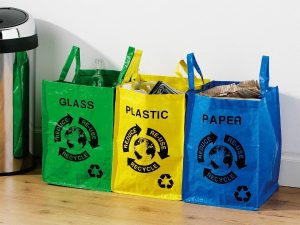The number of plastic carrier bags found on UK beaches in surveys carried out by the Marine Conservation Society (MCS) has dropped by almost half between 2015 and 2016. This is the lowest number reported in over a decade, and fantastic news for marine wildlife.
The figures are published today in the MCS Great British Beach Clean 2016 report, based on surveys carried out in September 2016. In 2015 there were, on average, 11 plastic bags per 100 metres of coastline cleaned but in 2016 there were just under seven – that’s a decrease of almost 40% and the lowest number in the last ten years.
Here’s the summary report:
The charity began calling for action on single use carrier bags in shops back in 2008 and was instrumental in getting a levy introduced in Wales in 2011, Northern Ireland in 2013, Scotland in 2014 and England in October last year.
“In the last decade, our Great British Beach Clean volunteers have found an average of ten single use carrier bags for every 100 metres of coastline cleaned. This year, for the first time since the charges were introduced, we’ve seen a significant drop in the number and that can only be as a result of the 5p charge which is now in place in all the home nations. It vindicates the charge, which we predicted would be good news for the marine environment. Thanks to our thousands of fantastic volunteers who collect beach litter data, we can now see the impact these charges have had,” says Lauren Eyles, MCS Beachwatch Manager.

Beaches in England and Northern Ireland saw the biggest drop in the number of plastic bags found during the September clean up – over half compared with 2015. In Wales, where the charge has been in place for five years, the number – just under four bags for every 100 metres cleaned – is significantly lower than any other year since 2011. In Scotland, volunteers found, on average, one bag fewer over the same distance this year compared with last year. MCS says overall the trend is down and that can only be good news for visitors and wildlife.
MCS says there has been a drop of almost 4% in the numberof litter items found on UK beaches between 2015 and 2016 – but with 268,384 individual items of litter collected at 364 events by just under 6,000 volunteers, there’s very little to be cheerful about when it comes to the sheer quantity of litter on our beaches.

Beaches in Scotland saw a decrease of 18% in overall litter levels, rubbish in the North East dropped by 14% and in the Channel Islands by 10%. But there were increases in the amount of beach litter in the North West (24%), Wales and the South West (15%) and in Northern Ireland (9%).
Data collected by Great British Beach Clean volunteers also showed a rise of over 4% in the quantity of drinks containers found on the UK’s beaches – including plastic bottles, bottle tops and aluminium cans. And there was an astonishing rise in the amount of balloon related litter found on UK beaches – a 53.5% increase on 2015. The charity says it’s taking its ‘Don’t Let Go’ campaign to a local level to persuade more councils to ban the release of both balloons and sky lanterns on their land.

Turtles mistake plastic bags and balloons for their jellyfish prey, and the items can block their digestive systems leading to death from starvation. It has recently been shown that some species of seabirds are particularly attracted by the scent of this plastic junk ‘food’.
The charity says the England litter strategy, currently being drafted by Defra, and strategies elsewhere across the UK, must include specific actions to tackle the problems highlighted by the surveys.
MCS’ beachcleaning work is supported by players of People’s Postcode Lottery, enabling teams of volunteers to clean up huge swathes of our beaches.

The Marine Conservation Society (MCS) is the UK charity dedicated to the protection of our seas, shores and wildlife. MCS campaigns for clean seas and beaches, sustainable fisheries, and protection of marine life. Through education, community involvement and collaboration, MCS raises awareness of the many threats that face our seas and promotes individual, industry and government action to protect the marine environment.
MCS provides information and guidance on many aspects of marine conservation and produces the annual Good Beach Guide (www.goodbeachguide.co.uk), the Good Fish Guide and www.goodfishguide.org relating to sustainable seafood, as well as promoting public participation in volunteer projects such as MCS Great British Beach Clean (www.mcsuk.org/beachwatch) and Basking Shark Watch www.mcsuk.org.
The MCS Great British Beach Clean is the annual flagship event of our ongoing coastal environmental initiative, now in its 22nd year, and it occurs on the third weekend of every September. It’s the UK’s input to the global International Coastal Cleanup (representing 152 countries and locations), which occurs over the same weekend in September, providing a world-wide snapshot of marine litter.
The Great British Beach Clean 2016 took place on the 16th to 19th September 2016.
The Great British Beach Clean 2017 will take place on 15th -18th September 2017.



















4 Comments
It’s a great start but we’ve a long way to go. I’d like to see the carrier bag charge doubled and a charge on non-recyclable coffee cups and polystyrene fast-food containers. The amount of rubbish the winter storms bring to the beaches is awful but the amount actually in the seas is far more worrying. Well done to the MCS – keep on fighting!
It doesn’t matter what I buy from our local shop, I always have to tell them not to put it in a plastic bag – I usually have a bag on my shoulder, so it’s obvious I don’t need one, but they always seem really confused, and slightly offended. The MSC has a long way to go before it can reach the majority – charging more for plastic bags is the only way I think. When I used to do regular events, I took a mug with me, and people were happy to serve me coffee in it, rather than a polystyrene cup. I guess people might steal them if they served coffee in mugs?
It is a success story, but yes, a minor one. The amount of floating/suspended plastic debris in the oceans is massive and a shameful situation.
I recently went to a conference where there was a talk on, not floating debris such as plastic bags, but on microplastics. I knew about the plastic beads that were put into cosmetics, but what I didn’t know was that sythnetic fibres from clothing all degrade and create suspended and sedimentary microplastics in the marine environment which then get ingested by fauna.
Each time you put a garment made from synthetic fibres into a washing machine these fibres get washed into rivers and then the sea. This is bad enough from an environmental perspective, but if you eat sea-food then these microplastics accumulate in the organisms that you eat.
So, in addition to not using plastic disposable cups, or buying “fast-food” coffee, etc, it is worth thinking about what you wear.
See:
http://resodema.org/publications/publication9.pdf
http://www.sams.ac.uk/education/postgraduate/microplastics-in-the-deep-sea-environment
Yes, the overall trend is downwards as far as the environment is concerned. You could say that nothing is really ‘unnatural’ – if it exists, or can be made, it’s natural. That may be true, but evolution has delivered us to a place of incredible complexity, and has provided an enormous number of resources that we can use as food, building materials, clothing etc. But they all degrade. When we make things that are intended not to degrade, or to degrade very slowly, or that are useful to the human economy but toxic to life, we are introducing things into the environment that nature hasn’t evolved to cope with. Evolution introduces new things very slowly, and the plants and creatures that the new thing interacts with have time to adapt.
There may be no room for plastic at all in a sustainable human future, or any other synthetic material – at least not so much that it pushes us beyond nature’s limits. But I don’t see any mechanism for keeping us within nature’s limits, or much appreciation amongst decision-makers that they even exist. But they exist, and nature is beginning to show us that they do. She won’t listen to excuses about certain actions being bad for the economy, and she’ll show us that we should always put ecology first. We’re a long way from that at the moment, but I hope, as a species, we see it before it’s too late.